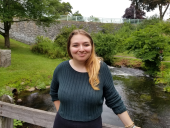Taryn Barnett

Master's student with a demonstrated interest in Environmental Justice. Demonstrates knowledge and interest in cultural and intellectual property, digital anthropology, visual anthropology, and environmental anthropology—proficiency in designing digital assets for environmental campaigns through the Environmental Media Lab at the Abess Center at University of Miami. Present portfolio highlights several past and ongoing projects with the Everglades Law Center. Thesis topic will include a participatory collaborative-based media project with local communities in South Florida with the goal to provide a space for the decolonialization of the Everglades and diseminating the settler-colonial histories of cultural institutions. Currently partnering with Forests Forever in advocating agency for the Coastal Yuki and Pomo people in the co-managemnt of their ancestral lands
2023 Curriculum VitaeProjects
Social Media Toolkit for the Everglades Law Center
Everglade Law Center's social media kit is a promotional public relations tool that can serve several functions, including promoting the launch of our new website or helping us spread the word on Land Use and Sustainability, Waters and Wetlands Protection, Endangered Species and Wildlife ,and Public Lands Protection. Please use this toolkit to help us build momentum to defend Florida's ecosystem and communities.
Anthropogenic Pressures on Coral Reefs
Undersea cables remain largely invisible to the public and supports our global network society. Often referred to as energetic monsters undersea cables transport almost one hundred percent of our digital communications rather than satellites. If the importance of undersea cables is primarily unnoticed by the public, then people will not think to contest or disrupt them. Leaving internet cables out of view to the public perpetuates the notion that the internet lacks physicality. Public representations of undersea cables divert the public's attention away from the physicality and instead promote narratives on dematerialization. Despite the rhetoric of wirelessness, technological devices utilize more wires - technological systems arrive and advance at all points in time and are not necessarily better. The purpose of this project is to expose the vast physicality of the internet as well as deconstruct the impact undersea cables have on coral reefs along the southeastern coast of Florida.
Blog for Everglades Law Center
Project is a part of my work with the Environment Media Lab and the Everglades Law Center that will include a completely re-write of their "Latest News" section
Datasets
Decolonialism: Exploring Indigenous Rights in Settler-Colonial Museums and Cultural and Intellectual Property
Digital technologies are increasingly integrated into collections management in cultural institutions. The emergence of digital technologies in museums is not new but instead a part of a long-standing trajectory of networking and foraging representations of relationships between people and things. The purpose of this dataset is to collect texts that indicate how the digital in museums creates an epistemology for understanding the relationality between objects, knowledge, people, and the environment. The dataset will analyze the digital as a means of restructuring knowledge systems and media epistemologies so that cultural archives do not equate the digital and physical (the object).
Affective Ecologies and Indigenous Rights
Dataset will explore and emphasize the importance of the emotive, sensory, and other experiential ways that humans and non-humans relate. Affective experiences involve embodied sensations and experiences of the force of other beings that emphasize that being (human or non-human) is not an essential. The purpose of the dataset is to focus on the restoration of life ways and food for cultural survival and as expressions of self-determination and highlight the continuity across humans and non-humans nature. According to Native American epistemologies, to be healthy is to have access to a full spectrum of relational expriences: spirituality, interdependence, reciprocity, and harmony within families and the natural world. Specifically, the dataset indicates that Native America self-determination efforts have encouraged a reintroduction of bison and commands a central role in keeping with the bison's status as a cultural keystone species. Affective ecologies are embedded in and realized through spitirual customs and worldviews